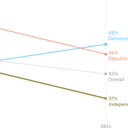Axios-Ipsos poll: Independents are fed up with elections

Independents' faith in Americans' voting choices is in a dismal place after the 2020 election, much more pessimistic than the way Democrats or Republicans feel, according to a new Axios-Ipsos poll.
Why it matters: The historically bitter fight between Donald Trump and Joe Biden energized the most partisan voters, but it was a big turnoff to those whose views may align with one major party or the other but who don't claim allegiance to either.
What they're saying: "I think they're the ones who are really being damaged by this," said Ipsos pollster and senior vice president Chris Jackson.
- "This is saying they're feeling increasingly alienated from politics."
Driving the news: The national survey of U.S. adults was conducted for an Axios deep dive on voting and democracy.
- More results from the poll, which measured Americans' trust in the fairness of elections and the accuracy of the results, will be released this afternoon.
By the numbers: Compared with the results of a 2019 poll by Ipsos and C-SPAN, the new poll shows a sharp drop in confidence among Republicans as well, but a more precipitous drop among independents, who already were starting from a lower place.
- Independents have soured on elections more than partisans from both parties.
- Just 37% of independents say they have confidence in the wisdom of the American people's choices on election day, compared to 48% of Democrats and 46% of Republicans.
- Only Democrats gained some confidence after the 2020 election.
- Among the minority of people who say they don't bother to vote in elections because there won't be any changes that make their lives better, independents were the only group that saw a significant jump — from 11% in 2019 to 16% now.
Methodology: This Axios/Ipsos poll was conducted Nov. 3-14 by Ipsos' KnowledgePanel®. This poll is based on a nationally representative probability sample of 1,273 general population adults age 18 or older.
- The margin of sampling error is ±3.0 percentage points at the 95% confidence level, for results based on the entire sample of adults.